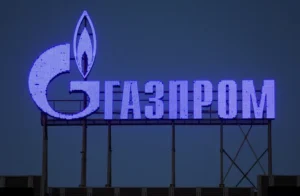The agreement will involve billions of dollars, according to Iranian media, and will come despite sanctions on Russia and Iran.

Gazprom has signed a major agreement in Iran even as it says it cannot guarantee gas supplies to Europe.
The agreement will involve billions of dollars, according to Iranian media, and will come despite sanctions on Russia and Iran.
The company has declared force majeure, which enables it to cut supplies during extreme conditions. This means even as Gazprom is at the center of controversy in Europe, it is making deals in Iran.
Russia Iran relations
Russia’s President Vladimir Putin is in Iran this week and is seeking to push for more bilateral strategic agreements with Tehran.
The US has said Russia is looking to acquire Iranian drone technology.
Iran’s pro-government Tasnim news said that the CEO of Iran’s National Oil Company had told reporters that there would be a signing ceremony of an MOU with Gazprom and images on Tuesday showed the lead-up to the ceremony.
“This MoU will be the largest foreign investment in the history of Iran’s oil industry, as it will lead to an investment of several tens of billions of dollars of Russian investment in Iran’s oil and gas fields,” the report said.
Estimates say the agreement could eventually be worth some $40 billion.
Iranian energy industry
The National Iranian Oil Company (NIOC) is a government-owned national oil and natural gas producer. It was founded in 1948.
Iran has sought some $140 billion in investments for its oil and gas sector. It has counted on Russia and China for this support. Earlier reports say that Iran exports around 800,000 barrels of oil a day. NIOC CEO Mohsen Khojasteh Mehr said in March that the country’s crude oil exports had increased by 40 percent since the summer of 2021. Reports in November 2021 noted that Iran has said it is ready to produce 700 million cm/d of natural gas from 37 offshore platforms in the South Pars field.
The Kish gas field and North Pars gas field will be among those that receive huge investments.
The report said some 100 million cubic meters per day (cm/d) will be added to Iran’s gas production. In all, six fields will be developed by Gazprom. Another part of the agreement will focus billions in investment in the South Pars gas field. Gas swaps and oil products will be part of the project.
“We are designing a package so that we can transfer technology to centers in the field of technology,” said the report. The research will be part of the MUO.
According to the Iranian media and statements from Iran’s energy sector, “Iran and Russia have a total of 70 trillion cubic meters of gas reserves, which is 30% of the world’s gas reserves. Therefore, these two countries play a very important role in ensuring the world’s energy sustainability.”
circumventing sanctions by the West
The report also discussed the issue of sanctions. Iran and Russia are both under sanctions in the West. The report says that the Iranian National Oil Company has already dealt with contracts with Russian companies despite sanctions.
“There is no concern about the role of sanctions in the failure of these understandings and contracts,” the report says. There is also an eight-year plan in Iran that aims to invest massively in this sector.
“In this context, we will use foreign investment in the framework of obtaining maximum national benefits, and today we see that we are negotiating and signing contracts and memorandums with large and well-known international companies,” the company said.
The world needs Iran’s oil, said the head of National Iranian Oil Company (NIOC) Mohsen Khojasteh-Mehr as he outlined his company’s new operational and development strategies.
“The world needs Iran’s oil, and the share of Iran’s oil exports cannot be removed from the world market, and this shows that Iran is a reliable and stable country for supplying energy to the world.”
The gas fields mentioned in the report include South Pars and Kish, as well as six fields said to be Mansouri, Abtaimur (Ab Timur), Karanj, Azar and Changuleh. The names of the fields were translated from Persian and may include spelling errors.
